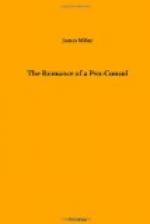’Mr. Gladstone was always a most charming personality, and I recall his friendliness in walking up with me to the hall of ceremonies, when I received the honorary degree at Cambridge. He also was to have the honour conferred upon him that day, and it was considerate on his part to convoy me along, as I knew few people at Cambridge, the result of absence from England.
’As to public affairs, I suspect that he and I held widely different views, at all events on some subjects. Like everybody else, I recognised in him a commanding figure, but I am bound to say that his greatness seemed to me to lie in carrying out ideas, after they had been suggested by others, rather than in working them out himself.’
Sir George meant that Mr. Gladstone’s genius as a statesman, was constructive more than creative, the fashioner of progress. For himself, a solitary idea sufficed to keep his heart warm, even in the colds of age—the federation of the English-speaking people. In one of the last letters he received from David Livingstone, there was the request, ’Write me often, because you cheer me up.’ It was always possible to cheer Sir George up on federation; that set him aglow.
There were few to listen when he first preached the federal idea; he cried in the wilderness, but he did not cease to cry. He waited long for the echoes to come back, and they did come, with interest, too, when negotiations for an Anglo-American treaty of arbitration went afoot. Then, the negotiations tumbled through, whereat he said: ’Oh, the road may be a gradual one, with hills and stops, but there it lies, traced by destiny, and in the fulness of time it will be trodden.’
Peering into the twentieth century, one who would never see it, he foretold that its great problem would be this of Anglo-Saxon federation. It was not for us to dip into the future, farther than we could reasonably behold, but so far we were not only entitled, but bound, to go. He doubted whether any question, equal in importance to federation, had ever before engaged the attention of so large a portion of mankind. On that account he put forward with diffidence, the views which, after much reflection, he had formed upon it.
By Anglo-Saxon federation, he understood joint action, in the interests of mankind, on the part of those owning allegiance to the English tongue. Forms and methods might take care of themselves, so the thing itself was begotten. Yet that could only be, if the ties sought to be woven were elastic, free and freedom-giving. He wanted a golden chain, binding men to men the Anglo-Saxon world over, but a curb-chain nowhere.
‘I am,’ he spoke, ’merely expressing what is generally agreed, when I say that the end of the nineteenth century has brought us to a critical period in the history of the world. Systems of government do not last for ever; they decay and have to be replaced. The most perfect of machines wears itself out, and another has to be substituted.




